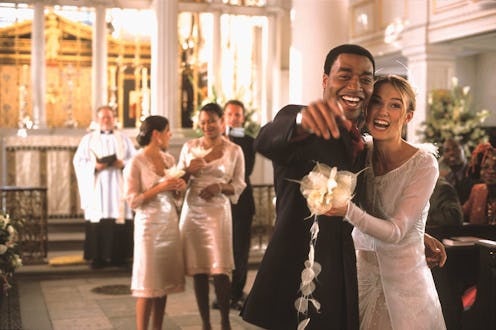Books
This Book Reminds Us Of A French 'Love Actually'

Judging by the title alone, Tony award-winning playwright Yasmina Reza’s new novel Happy Are the Happy (Other Press) sounds like a peppy book that a character in everyone’s favorite rom-com Love Actually might read. The cover of the book even has a heart on it!
But not so fast: This is a French book, written by a celebrated French writer. And the heart on the cover has black scribbles all over it. It’s a book about love that’s brimming with ennui. C’est tragique!
Reza’s plays Art and God of Carnage both earned her Tony Awards for Best Play, and she brings that same dark humor and cheeky brooding to Happy Are the Happy. The book is a series of vignettes each told from the point of view of a different character, and as you read, the same characters appear in the most unlikely places, which creates the same kind of intertwined lives thing that Love Actually had going on. The connections in Reza’s book are more nuanced and deftly plotted, though. And her stories are full of tragicomic revelations and despondent declarations — Francophiles who adore Camus and Proust and Nin and Simon de Beauvoir will adore Happy Are the Happy. Lovers of black comedy will adore it, too.
In honor of Reza’s new book, let’s take a look at five ways Happy Are the Happy is like the rom-com that everyone either loves or hates, Love Actually. Although it's not exactly the same (and I'll tell you why) there are plenty of things that Love Actually-watchers will recognize in these pages.
Lives Are Intertwined
The adorable vignettes in Love Actually follow various characters whose lives intersect in one way or another. Reza’s book does the same — although it takes the idea of intertwined lives much more seriously. Part of the (melancholy) joy of reading the book is seeing a minor character from one chapter suddenly pop up in another chapter as the main attraction, or the narrator of one story appear as an extra in someone else’s existential love story. So Robert and Odile Toscano, the first couple you meet in Happy Are the Happy, who happen to be having a dire argument over some Morbier cheese, weave their way throughout the book in unexpected ways.
Love Is Pain
Love can be painful in rom-coms, but it’s painful in adorable, harmless ways. Everyone is in agony in Love Actually (even a 9-year-old kid). When we're reading Happy Are the Happy, we get the agony thing, too — although the characters are in French agony, which is much more soul crushing and calamitous. It’s darkly comic rather than ha-ha, this-is-adorable funny.
“I’d like to suffer for love,” says Philip Chemla in Happy Are the Happy. “I’d like to know a certain kind of sadness.” To be fair, that’s very different than Prime Minister Hugh Grant acting goofy in front of his hot new assistant that he’s suddenly fallen magically in love with. Reza’s characters are “stricken by melancholy” and “suffer from solitude.” But Hugh Grant and everyone else in Love Actually suffers and feels stricken too, so the message is the same: Love is a road that’s paved with agony, but c’est la vie.
Life Is Suffering
Happy Are the Happy is about love, relationships, family, and human connection. Some stories are about lovers, some are about fathers and sons, or siblings. Love Actually has the sibling thing with Laura Linney and her mentally unstable brother for whom she sacrifices everything — including sex with the man she’s been lusting over for the entire freaking movie.
“Awful. Awful. Awful,” proclaims Reza’s character Jeanette Blot. “I can’t wear any fitted clothes. I have no more waist. My bust has expanded.” And later: “I understand people who like bad weather,” Jeanette admits. “Bad weather doesn’t give you ideas about going to visit a flower garden.” Damn girl! You can see Jeanette and Linney’s character Sarah moping together and philosophizing about bad weather and terrible luck at a dive bar somewhere.
Everyone Has Affairs (or Thinks About It)
This notion is trés French. Not to stereotype an entire nation — sorry! — but isn’t everyone just running around having secret rendezvous and feeling no guilt? Alan Rickman has an evil temptress for a secretary in Love Actually (she even wears a devil costume to a party), and Colin Firth retreats to a cabin when he catches his girlfriend cheating on him — with his brother! It was a scandal.
In Happy Are the Happy, unhappily and happily married couples have flings, and it’s just the way of the world. “There are no married men,” says a character named Chantal Audoin. “No men who are off limits." She’s a real femme fatale, like Rickman’s secretary.
Love Is Complicated
The moral of both stories (though Reza’s stories are much more rich and layered and sophisticated and literary) is: Love/life/relationships are many splendored things but nothing is simple and love is complex. Couples in Happy Are the Happy may want to murder each other over a piece of Morbier cheese, but they can still be bound by love and time and memory. Alan Rickman may flirt with his devious secretary, but that doesn’t mean he’s fallen out of love with his beautiful wife.
The title of Reza’s book comes from some lines by Jorge Luis Borges: “Happy are those who are beloved and those who love and those who can do without love. Happy are the happy.” That could fit quite nicely at the start of Love Actually, if you add a happy pop song and remind everyone that it’s all going to work out in the end. In Happy Are the Happy things don’t wrap up so neatly, but that’s what makes it so marvelously French.